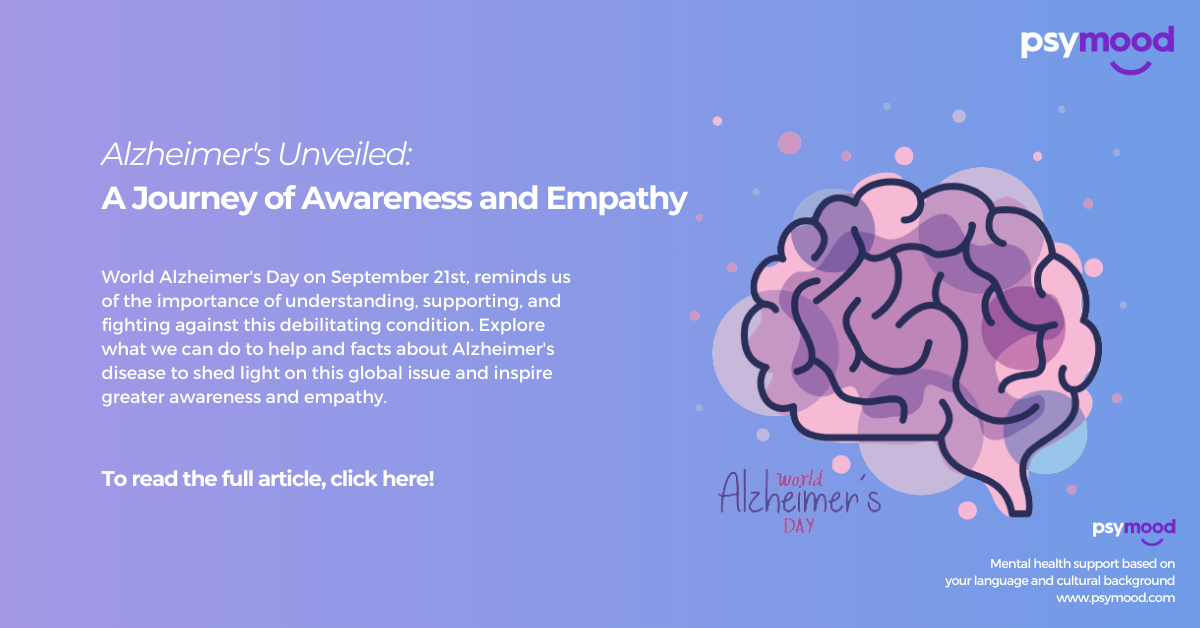Alzheimer's Unveiled: A Journey of Awareness and Empathy
Every September, the world comes together to observe World Alzheimer’s Month, a time dedicated to raising awareness about Alzheimer’s disease. This month includes World Alzheimer’s Day on September 21st, serving as a poignant reminder of the importance of understanding, supporting, and fighting against this debilitating condition. In this article, we will explore what we can do to help and facts about Alzheimer’s disease to shed light on this global issue and inspire greater awareness and empathy.
Alzheimer’s disease, often at the forefront of discussions on dementia, deserves a closer look. Within the realm of dementia, Alzheimer’s is the prevailing force, accounting for approximately 60-80% of all dementia cases, underscoring its prevalence. One of the hallmarks of Alzheimer’s is the presence of abnormal protein deposits in the brain, including beta-amyloid plaques and tau tangles, which disrupt communication among brain cells, causing cognitive decline. Yet, Alzheimer’s doesn’t stop at the individual diagnosed; its reach extends to caregivers and families, inflicting emotional, financial, and physical tolls. In the face of these challenges, support networks emerge as unsung heroes, providing the essential care and empathy needed to navigate this complex journey.
Why Awareness Matters
- Early Detection: Increased awareness encourages early detection. Recognizing symptoms like memory loss, confusion, and mood changes in its early stages can lead to better management of the disease.
- Reducing Stigma: Awareness helps dismantle the stigma surrounding Alzheimer’s disease. Understanding that it’s a neurological condition rather than a natural part of aging fosters compassion and support for those affected.
- Supporting Caregivers: Caregivers play a pivotal role in the lives of individuals with Alzheimer’s. Awareness can help connect caregivers with resources, support groups, and respite care.
- Advancing Research: Greater awareness can lead to increased funding for research. A cure for Alzheimer’s may still be on the horizon, but awareness campaigns can accelerate the journey toward finding one.
How We Can Help
- Create Dementia-Friendly Spaces: Advocate for and create dementia-friendly spaces in your community. This includes training businesses, public places, and healthcare facilities to be more accommodating to individuals with Alzheimer’s.
- Support Caregivers: Caregivers play a vital role in the lives of those with Alzheimer’s. Offer emotional support, respite care, or practical assistance to caregivers in your community. Even small gestures like helping with grocery shopping or providing companionship can make a significant difference.
- Encourage Brain-Healthy Habits: Promote brain-healthy habits among friends and family members, such as regular physical exercise, a balanced diet, mental stimulation, and social engagement. These lifestyle choices may help reduce the risk of Alzheimer’s.
- Be Compassionate and Patient: If you encounter someone with Alzheimer’s, practice patience, empathy, and understanding. Simple acts of kindness, such as listening attentively and showing respect, can greatly improve their well-being.
- Volunteer: Numerous organizations dedicated to Alzheimer’s awareness and support rely on volunteers. You can assist in organizing events, fundraising, or providing direct support to those affected by Alzheimer’s.
Alzheimer’s disease is a formidable challenge that impacts millions of lives globally. While a definitive cure remains elusive, ongoing research and increased awareness offer hope for the future. By understanding the facts and sharing fun facts about Alzheimer’s, we can contribute to a world where this disease is better understood, supported, and ultimately, conquered. Together, we can make a significant difference in the lives of those affected by Alzheimer‘s.
PsyMood is a digital tool designed to help you find the support you need in the language that you are most comfortable with. PsyMood considers cultural background, geographical location, interests, and personal needs, amongst other factors, to pair you with service providers for either online or in-person therapy sessions.
For More Interesting Posts
You may also be interested in learning more about Treat our Mind as Muscles, and Let’s Get Fit!, and National PTSD Awareness Day: Recognizing the Silent Struggle.


.png)
.png)
.png)
Recent Comments